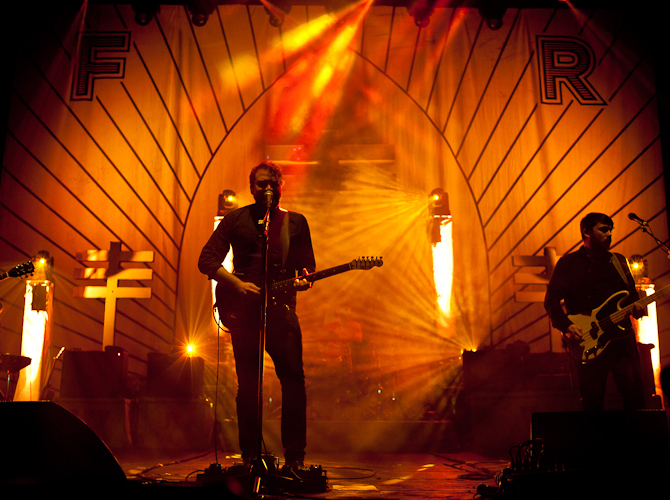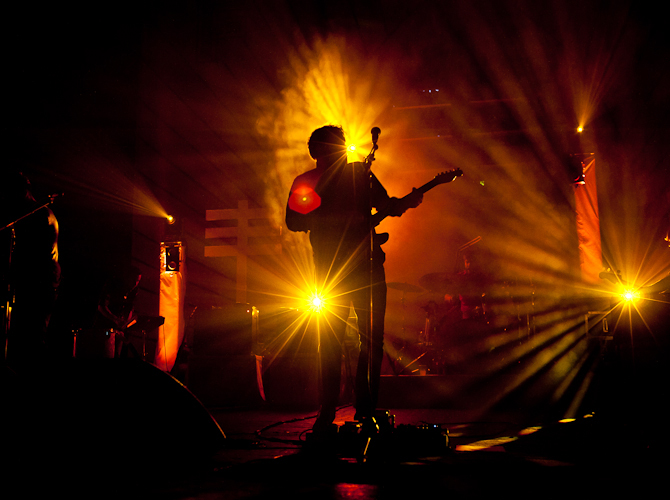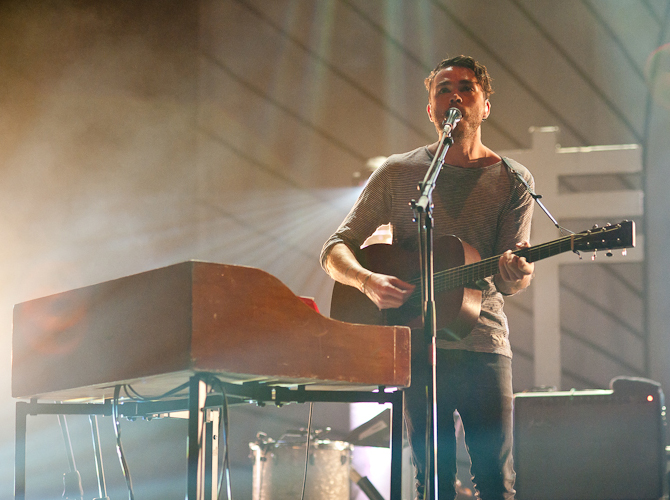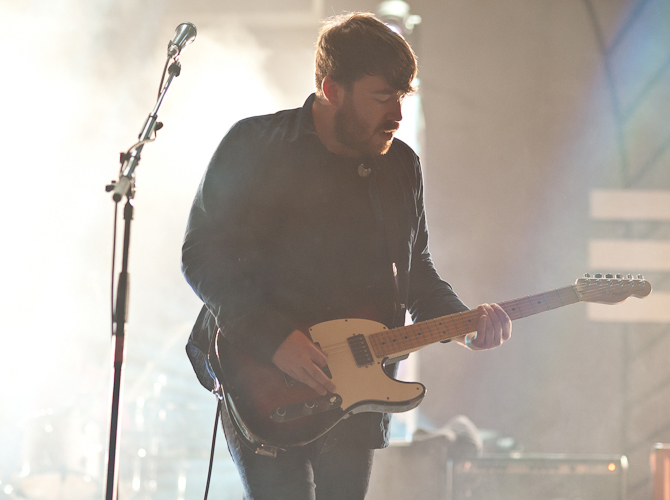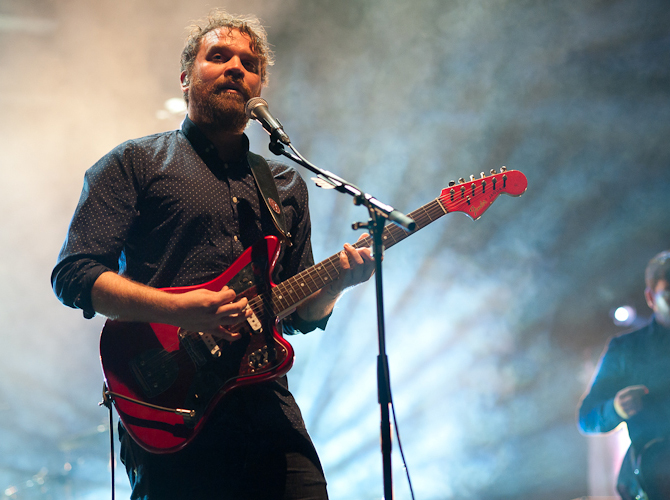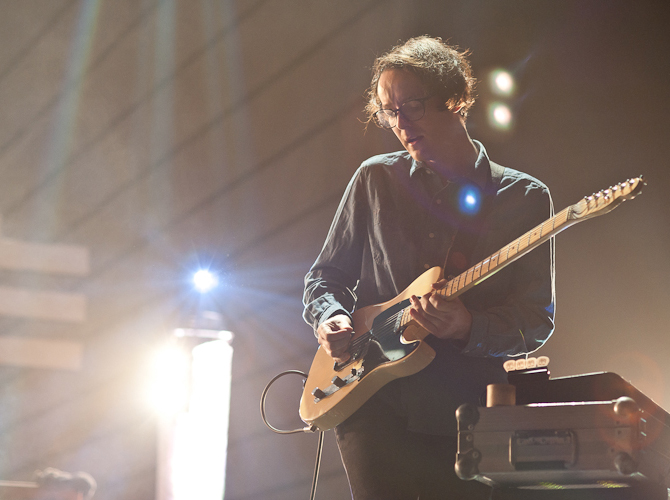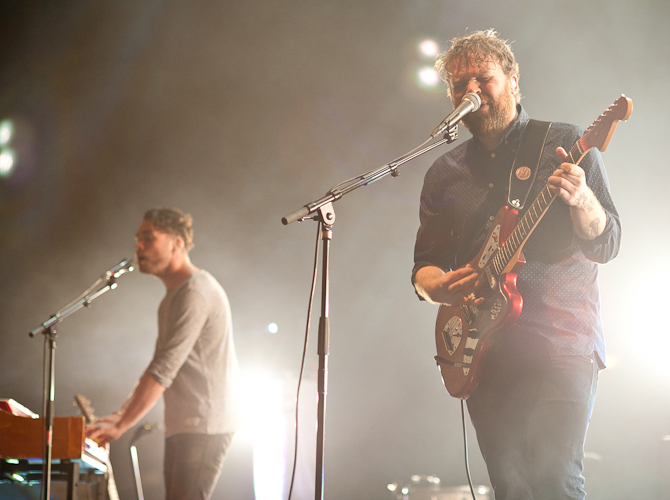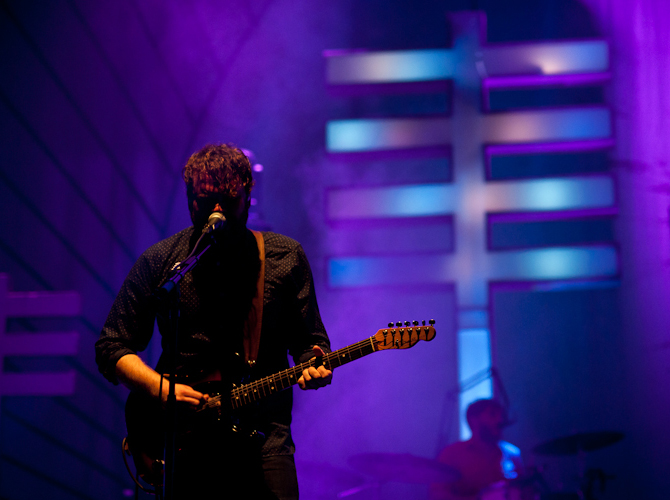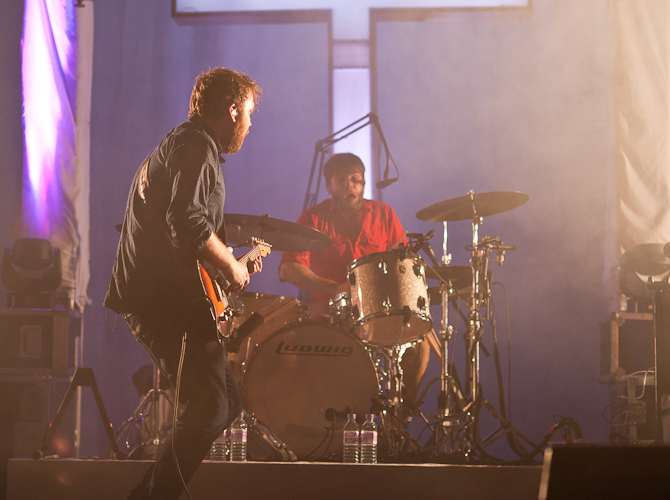More about: Frightened Rabbit
I meet Scott 'Owl John' Hutchison in a quiet corner of the Rustique Cafe in Tufnell Park, just hours before Frightened Rabbit make their London live return with a less than secret show at Boston Music Rooms to launch their resplendent new album, Painting Of A Panic Attack. My notes are little more than sparse signposts, and it dawns on me that's because I've probably interviewed Hutchison more than any other artist - on a nearly bi-annual basis for much of the last decade.
See Frightened Rabbit's full Gigwise takeover below
We chat over our usual subjects of booze, The National and The Twilight Sad, and pick up the thread that sees F'Rabbit enter the most interesting chapter of their career to date. Assisted by one their favourite band's The National's Aaron Dessner on production duties, they are about to release their most 'complete' album. Trust us, it's magnificent.
After his tour van haze clears, Scott looks up from his menu to order an avacado and cheese panini. Has the 'Furry Brick Built Man' gone vegetarian?
"I have," he admits, understatedly proud. "I don't trust meat in the United States. I realised I'm very much a person who needs to deny themselves something, otherwise I'm just going to eat meat like fuck. I'll just cut down on drinking, but never stop. This just stuck, it's been like eight months now. I do feel better, I've got other vices. I quit smoking then started again because of life shit."
And it's that 'life shit' in the States that has filled F'Rabbit with purpose, and makes Painting Of A Panic Attack such an assured and compulsive listen. Departing his native Scotland for LA, he forged his life around his girlfriend, but beyond that found himself isolated among the faceless void of Los Angeles dickheads - alone with his thoughts, his music and his sense of self. It's not just the meat in America that he didn't take a liking to...
"I assimilated into the community," he says, before wincing. "Well, I don't think there is a community in Los Angeles. It didn't make me want to make a Big Star record or something, but because I was quite lonely - living in a small world with one other person. Something like 'Get Out' on there describes this fortress that we built around each other. My girlfriend, she's not from there either. That can become a really unhealthy thing so I was living inside my own head a lot of the time.
"My outlook didn't really change while I was out there. If anything I did become more introvert than I was in Scotland. I get back to Scotland and I'm constantly socialising, whereas I would go a month out there without really seeing anyone. It was great for work - I got a lot of work done. It definitely wasn't the sunny, positive experience that I was perhaps expecting. It's not the fault of the place - I found some wonderful places and wonderful people out there."
Wonderful as they may be, is it safe to say all the cliche's of cigar-toting suits and air-headed showbiz scrotes are true...
"You can make sweeping statements about Los Angeles because it's kinda true," he sighs with a wry laugh. "Everyone's out there trying to make something of themselves, and there were some genuinely good people that I met, but you can't go in a cafe without hearing like five different meetings going on - and it's all bullshit. It's a closed door as well - you can't just go 'oh, I want to start making movie soundtracks'. You have to force your way into that and I'm not a very forceful person. It did make me a better vocal communicator, especially living with an American - they express everything. I'm used to holding it all in and then vomiting it into a song. That definitely changed, and I'm glad for that. You can't hold it in, it would give you an ulcer."

And if there's one thing that Painting Of A Panic Attack does, it's out those demons - but it doesn't wallow. F'Rabbits' fifth album wades through the heartache, confusion and isolation to emerge with a vivid clarity, purpose and sense of self. I put it to Scott that these could be the most relatable songs he's written - especially when it comes to helping the listener see through darker times.
"Thanks man," he says, with a bittersweet gratitude. "My mum even described it as a 'healing album'. I don't know if it's any more personal or any more cathartic than anything else I've done. There's a lot less cacophonous bluster on this album and a lot more beauty in the music, and it's a more pensive listen. This is one of the first interviews I've done and I'm still thinking through what these songs mean to me."
What the songs may mean to Scott is one thing, but he's more aware than anyone of the life that his music takes on in the lives of Frightened Rabbit fans. You'll find few artists who present such fearlessly raw-nerved and often crippingly honest snapshots of his life, struggles and psyche as Hutchison - just look up 'Poke' or 'The Modern Leper'.
"There's a thread and a story if someone's been following us from even the second album.," he replies, musing over Frightened Rabbit's relationship to their dedicated followers. "It's a story which is a personal one to me, it's almost the characterisation of my life and there's an involvement in that, which brings about the loyalty in our fans. All that's required is for there to be a continuation of that, and for there to be familiar elements dressed up slightly in every record. I would never take the contrived move to make an electronic album."
So Frightened Rabbit would never go Kid A?
"No!" he laughs. "That is a great album but it's been done. It's a very clear move in another direction which I think feels forced sometimes if you're not Radiohead. There's development but there's very much a core character to this album. It's my life, but it's hopefully open enough to not just be 'ooh, let's listen to what Scott's been up to'. All a Frightened Rabbit fan wants is a place to go and consider what it means to their lives."
I hold up the album's artwork at the monolithic but ambiguous structure on the sleeve and ask if that this record represents such a place, and what that really means.
"There was a while when the album was going to be called Monuments," he recalls. "We were back and forth in the band and we thought it was too open and vague and sounded just like any other album, but it did inform the direction of the artwork. It's about a monument being a place to go to remember something awful, which Painting Of A Panic Attack being a beautiful representation of something horrible. It's somewhere the listener can go. It's no longer about my life, but what you bring to that place. The title and the artwork don't have an obvious correlation, it's important to give an album a place - and this gives it a place. You're the first person to ask, so thanks - that's going to be in the script now."
I remind Scott that the last time we spoke, when Painting Of A Panic Attack was still in gestation, Hutchison referred to the sound and mood of the album as 'same shit, different colour'.
"In a way, and I'm OK with that!" he smiles. "There are basically infinite ways you can discuss and approach the topic of a relationship breaking down, or having a horrendous night on alcohol. Those things don't go away, and they're still at the forefront of my life really.
"I was sending some demos, initially very early ones, and wasn't getting much of a reaction from the band. Then (brother and drummer) Grant was like 'this isn't how you usually write'. He said 'I can see what you're trying to do, but it doesn't work'. Then after a couple of days of sulking, I realised that he was correct. It's not that I want to pander to expectations of what the content of the album might be, but that's what I do best. It's not a step backwards if you're expanding the vocabulary and the story of what's evolved."
After abandoning plans for a concept album about fictitious landscapes, Hutchison got straight back to the heart of what he knows best: "I have a wealth of material and experience in my head about leaving Scotland and being isolated in Los Angeles. With my relationship and my relationship with the world, I had a lot to say and it was almost a relief to go with that."
Once Scott stopped himself from 'editing out emotion', he naturally 'stumbled across states of turmoil'. Wrestling with the 'sickness' of presenting songs about a relationship with his life as it was ongoing, he discovered that veiling his feelings would not be giving them the most honest presentation of them. As he holds up the album while referring to his recent life events, I put it to him that making them manifest in song might in some way be cathartic.
"I suppose so," he admits. "I haven't quite found the right word for what it is, whether it's therapeutic or cathartic. I love that there are bits of my life in this little package right here. I like the mathematical approach. I was asked 'do I write stories or poems outside of music', and I don't because the structure of music really appeals to my brain. The process of finishing songs and putting them in a neat little place isn't cathartic, it's more like 'OK, I understand that now'."

Photo: Justine Trickett
But getting to that end point was never going to be an easy ride; not when uber-perfectionist Aaron Dessner of The National is behind the desk. We joke about how our every conversation for much of the less decade always falls down to The National, before Scott jokingly reveals that this was a tool they deployed in interviews to get the attention of the band - something that had more success when they did it with a brand of whiskey.
Anyway, F'Rabbit and The National would come to tour together, before more of their music was brought to Dessner's attention via producer Peter Katis (Interpol, Jonsi, The Twilight Sad). Had the band landed their dream? Some people are meticulous, others border of suffering from paralysis through analysis, but it's with this people you know - while the finish line may seem a long way off, it will be all the sweeter to cross when you get there. Through playing the long-game, he stripped the band of any expectations they might have of themselves, and just let the music itself choose its course.
"Aaron approaches it with commitment and he's got such a fiercely analytical brain, to the point that it's almost a disability," chuckles Scott. "He never stops trying to find the right path for a song, which is in equal parts inspiring and frustrating. At some point you're like 'is this our record?' His musicality is totally undeniable. I wrote 'Death Dream', but he plays piano on that. I think there's something very signature about the way that he plays. We didn't want it to go 'full on National', but he brings something. Although we were conscious not to repeat tropes we'd used in the past, he was even more conscious. Whenever I was tempted to lay on a big, chunky guitar line he'd say 'don't', and let us a big song be big but not force it if a song didn't need to go into that territory."
Scott adds: "His method of working is a constant investigation into a song. It's not finished until the record is mastered and the ink on the artwork is dry. We honestly thought this record was a piece of shit until the last two days, then it all made sense. If he was planning that, then that's pretty impressive."
The band themselves too, are prone at times to too much self-analysis, but that's all part of the grind. After their globe-spanning and victorious Pedestrian Verse tour came to an end in 2014, the band questioned whether they would continue. To bridge the gap, Scott made a solo record as Owl John, Grant biked across the UK for charity and campaigned for Scottish independence, other members did various production projects, and guitarist Gordon Skene would leave to be replaced by Simon Lidell ("Without going too far into it," Scott tells us, "Gordon's personality didn't fit with the band, and Simon's really, really does").
And indeed, where in the world of music do Frightened Rabbit fit? They're not 'scene' guitar music, they're not folk, they're not Bastille or Mumford & Sons, and they're a million miles from the increasing wave of nostalgaic gimmickry that far too many indie bands still choose to lean on - as they found on their last festival tour back in 2013.
"At that point, we were on a lot before or after Miles Kane," sighs Scott. "This fucking cunt walking about in a Union Jack suit in 2013 - who the fuck does he think he is? Then Alex Turner swans over in his Grease uniform. I just think it's childish. Now, the lines are pretty blurry. We blurred our lines in the other direction.
"Before we were quite staunchly a guitar band, and it's not like we've done a 180 but every guitar band has to look forward at what's happening at this point in time. In the months before we made the album, I was questioning if we ourselves were becoming retro, but I think this album is a discovery of where we should be going."
Just as they intended, Painting Of A Panic Attack has become the destination - a beautiful monument to something painful. Building it was an act of colouring the world and processing life, and visiting it is a revalation.
- More of our Frightened Rabbit takeover:
* Grant Hutchison's guide to the best pubs and pints in Glasgow
* Scott Hutchison's favourite music, books and TV
* Scott Hutchison's track-by-track review and guide to Painting Of A Panic Attack
Frightened Rabbit release their epic new album, Painting Of A Panic Attack on 8 April. Their upcoming UK tour dates are as follows, with tickets on sale here.
Frightened Rabbit will play:
Tue April 12 2016 - MANCHESTER Academy 2
Wed April 13 2016 - DUNFERMLINE Alhambra
Thu April 14 2016 - LONDON St John At Hackney Church
More about: Frightened Rabbit



